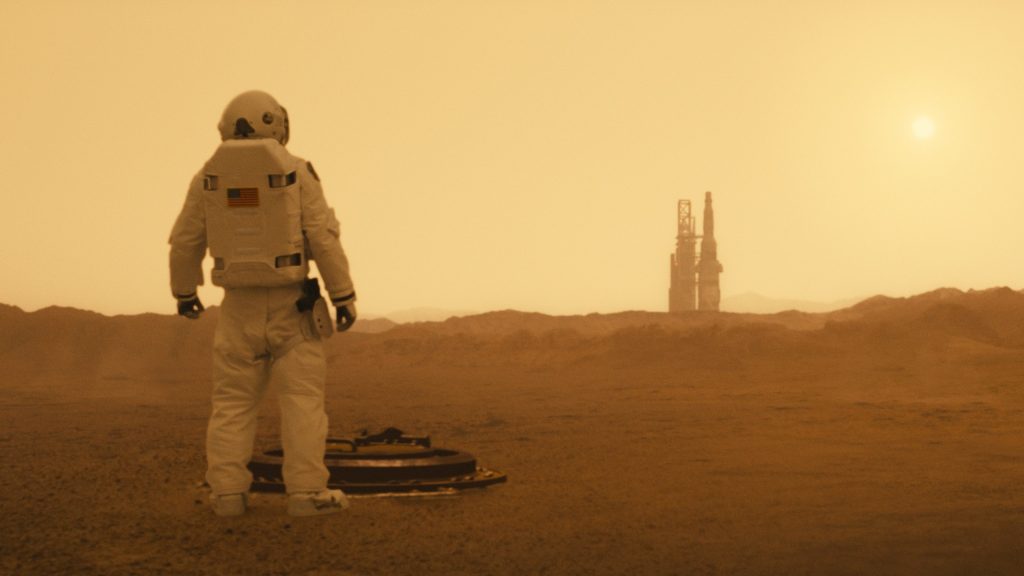Ad Astra (which is Latin for “to the stars”) rests firmly on the shoulders of Brad Pitt to carry it from start to finish. Directed by James Gray, it’s a slow, meditative story that focuses on personal stakes wrought large on a cosmic background.
Astronaut Roy McBride (Brad Pitt) barely manages to escape explosions at the exterior of the International Space Station (ISS), landing safely in a field on Earth. There, he soon learns that unnatural electrical surges are originating from a point near Neptune, where a prior crew had been stationed to search signs for extraterrestrial life. Dubbed the Lima Project, this was headed by Roy’s father, Clifford McBtide (Tommy Lee Jones), who has remained off grid for the last 16 years. Soon, Roy embarks on a mission to investigate the mystery and locate his missing father.
The story feels like a treatment of Apocalypse Now in space.
The film is reminiscent of Gravity during the opening sequence, and the loneliness felt by McBride during his journey harkens back to Interstellar. But visually, it feels like its own thing.
Space travel- and society at large- is distorted in Ad Astra. The moon is now another tourist destination, and while traveling to another base, McBride is set upon by pirates looking to scavenge resources. While people can travel across further distances than ever before, the inherent callousness and predictability in humanity is ever present. There are Subways, Applebees and Starbucks on the moon, which doesn’t stray too far from today’s truth.
While Roy McBride’s personal musings are present throughout the story, there are several set pieces that helps maintain the pacing. Although the story does sometimes cross over into pretentiousness, it keeps moving at a good pace.

Roy McBride is a distant, introspective character, but Brad Pitt pulls it off well. McBride is known for his calmness: his pulse famously never rises above 80 beats per minute. McBride’s monologues are spread out throughout the film: they are sparse, serving as a window into his psyche. How he relates to his father, Clifford, is the crux of the film. Clifford is the Colonel Kurtz of this film: a once celebrated astronaut who was the first man on both Jupiter and Saturn, we later learn that he cut off the life support of the Lima Project crew because they were committing mutiny against him.
There’s a lack of relatable side characters in the film. Liv Tyler, who plays Roy’s wife, is only briefly seen during flashbacks, and Mars’ ‘mayor’ (Ruth Mega) serves mostly as an aide in exposition, pointing him towards a mission that’s headed for Neptune, aiming to destroy the Lima Project with a nuclear payload.
This is, without doubt, an ambitious film, but it’s not without its flaws.
Subtext is often spelled out too clearly, and the chief conflict between father and son may not be relatable to everyone in the audience. There’s much to admire about the film’s craft, but it tells an insular story that doesn’t leave room for much else.
At the end of the film, Roy resolves to spend time with those closest to him, aware of his own isolation and having seen what his father had become when left to his own devices. It’s a good message: in the coldness of space, we are all we have got.
There’s Oscar buzz this year for Pitt’s performances in Ad Astra and Once Upon a Time…in Hollywood. There’s something to admire in his lonesome take on Roy McBride, and while he might not win the Oscar, he has certainly left an impression on critics and viewers alike.
If you are into sci-fi- especially films about space travel- then Ad Astra might surprise you. It inverts star-gazing into navel-gazing. It hits the right balance of introspection and action, and Pitt elevates the pulpy script into more engaging fare.